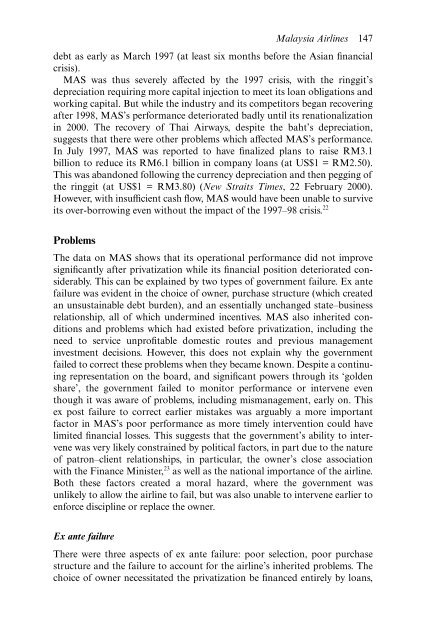PRIVATIZATION Privatization in Malaysia, Regulation, rent-seeking and policy failure
PRIVATIZATION Privatization in Malaysia, Regulation, rent-seeking and policy failure
PRIVATIZATION Privatization in Malaysia, Regulation, rent-seeking and policy failure
Create successful ePaper yourself
Turn your PDF publications into a flip-book with our unique Google optimized e-Paper software.
<strong>Malaysia</strong> Airl<strong>in</strong>es 147debt as early as March 1997 (at least six months before the Asian f<strong>in</strong>ancialcrisis).MAS was thus severely affected by the 1997 crisis, with the r<strong>in</strong>ggit’sdepreciation requir<strong>in</strong>g more capital <strong>in</strong>jection to meet its loan obligations <strong>and</strong>work<strong>in</strong>g capital. But while the <strong>in</strong>dustry <strong>and</strong> its competitors began recover<strong>in</strong>gafter 1998, MAS’s performance deteriorated badly until its renationalization<strong>in</strong> 2000. The recovery of Thai Airways, despite the baht’s depreciation,suggests that there were other problems which affected MAS’s performance.In July 1997, MAS was reported to have f<strong>in</strong>alized plans to raise RM3.1billion to reduce its RM6.1 billion <strong>in</strong> company loans (at US$1 = RM2.50).This was ab<strong>and</strong>oned follow<strong>in</strong>g the currency depreciation <strong>and</strong> then pegg<strong>in</strong>g ofthe r<strong>in</strong>ggit (at US$1 = RM3.80) (New Straits Times, 22 February 2000).However, with <strong>in</strong>sufficient cash flow, MAS would have been unable to surviveits over-borrow<strong>in</strong>g even without the impact of the 1997–98 crisis. 22ProblemsThe data on MAS shows that its operational performance did not improvesignificantly after privatization while its f<strong>in</strong>ancial position deteriorated considerably.This can be expla<strong>in</strong>ed by two types of government <strong>failure</strong>. Ex ante<strong>failure</strong> was evident <strong>in</strong> the choice of owner, purchase structure (which createdan unsusta<strong>in</strong>able debt burden), <strong>and</strong> an essentially unchanged state–bus<strong>in</strong>essrelationship, all of which underm<strong>in</strong>ed <strong>in</strong>centives. MAS also <strong>in</strong>herited conditions<strong>and</strong> problems which had existed before privatization, <strong>in</strong>clud<strong>in</strong>g theneed to service unprofitable domestic routes <strong>and</strong> previous management<strong>in</strong>vestment decisions. However, this does not expla<strong>in</strong> why the governmentfailed to correct these problems when they became known. Despite a cont<strong>in</strong>u<strong>in</strong>grepresentation on the board, <strong>and</strong> significant powers through its ‘goldenshare’, the government failed to monitor performance or <strong>in</strong>tervene eventhough it was aware of problems, <strong>in</strong>clud<strong>in</strong>g mismanagement, early on. Thisex post <strong>failure</strong> to correct earlier mistakes was arguably a more importantfactor <strong>in</strong> MAS’s poor performance as more timely <strong>in</strong>tervention could havelimited f<strong>in</strong>ancial losses. This suggests that the government’s ability to <strong>in</strong>tervenewas very likely constra<strong>in</strong>ed by political factors, <strong>in</strong> part due to the natureof patron–client relationships, <strong>in</strong> particular, the owner’s close associationwith the F<strong>in</strong>ance M<strong>in</strong>ister, 23 as well as the national importance of the airl<strong>in</strong>e.Both these factors created a moral hazard, where the government wasunlikely to allow the airl<strong>in</strong>e to fail, but was also unable to <strong>in</strong>tervene earlier toenforce discipl<strong>in</strong>e or replace the owner.Ex ante <strong>failure</strong>There were three aspects of ex ante <strong>failure</strong>: poor selection, poor purchasestructure <strong>and</strong> the <strong>failure</strong> to account for the airl<strong>in</strong>e’s <strong>in</strong>herited problems. Thechoice of owner necessitated the privatization be f<strong>in</strong>anced entirely by loans,


